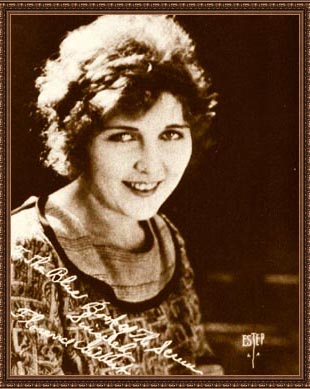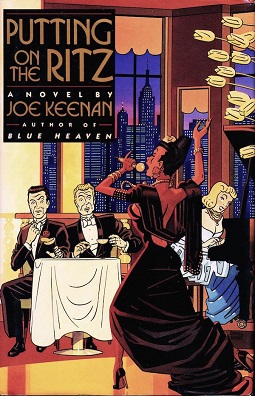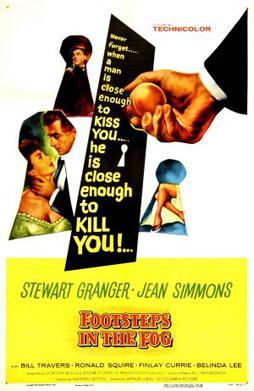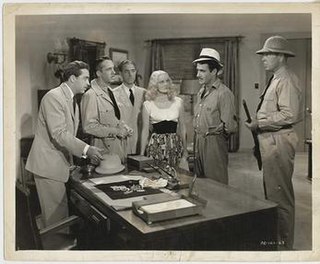Plot summary
Gilbert Selwyn's mother has remarried once more—this time to a successful but aging Hollywood producer. Gilbert, ever the schemer, lifted a few plot points from Casablanca (i.e., plagiarized the entire film and put a new title on it) and convinced his new stepfather to promote the script to actor Stephen Donato's producer. Gilbert convinces his friends, Philip Cavanaugh and Claire Simmons, to move to Hollywood to help him rewrite the script. They quickly uncover his deception. But since Gilbert told the studio executives that the script was mostly Philip and Claire's, they must help rewrite the screenplay or else find any chance of a career ruined.
Claire refuses to go along with the stunt, but Gilbert offers her the chance of a lifetime: Gilbert's agent, having heard of their success selling a screenplay, has offered the trio a chance to write actress Diana Malenfant's new film. The movie will be the first time Diana and her son, Stephen Donato, have acted together on screen since Stephen was 10, and it may prove the jump-start to Diana's career which she's been searching for.
Gilbert is able to wrangle an appointment with Diana Malenfant, who is not particularly interested. But Lily, her drunken and estranged sister, is writing a tell-all book. Philip convinces Diana and Stephen that he has a job assisting Lily with her memoirs, and that he could find out what Lily intends to say in her book. Shrewdly, Diana agrees to hire Gilbert, Philip and Claire to write her new film while Philip spies on Lily.
Stephen, who is gay, soon makes a secret rendezvous with Philip. He's worried that Aunt Lily might attempt to out him in her book. Stephen convinces Philip that he should not only spy on Lily but actually sabotage the book. Philip agrees. Lily's older brother, former child actor Monty Malenfant (and an openly gay man), is suspicious of Philip but goes along to keep Lily happy.
As if events were not complicated enough, Moira Finch suddenly shows up at Gilbert, Philip and Claire's home. She has heard about their deal with Diana Malenfant, and threatens to expose them as frauds. But Moira offers the three a deal: Moira has recently opened a ritzy Hollywood spa, but is lacking clients and cachet. Get Stephen Donato to show up for a free weekend at her spa, and Moira will forget all about how "Casablanca" happened to be sold (again) to one of Hollywood's biggest producers.
Philip soon finds that Monty is on to him. Monty confirms that Stephen is indeed a homosexual, which thrills Philip and leads to numerous fantasies. But Monty also threatens to expose Philip to Diana. Monty offers him a deal: Philip helps Lily turn her book into a best-seller, and nothing will be said to Diana.
Now Claire, Philip and Gilbert are caught in a bind. How do they help Lily while also ruining any chance her book might have? And what of Moira? Claire begins to suspect that her spa isn't quite what it seems, for Moira has far too much money and too many friends. The trio quickly get caught in a downward spiral of sex, closeted movie stars, hustlers, blackmail, secret videotape, a homophobic district attorney, a cute bartender, false fire alarms, car theft, impersonating a police officer, a sleazy public-access television host and a "night with Oscar" that has nothing to do with the Academy Awards.
Reviews
My Lucky Star was not widely reviewed in the mainstream press at the time of its release. Some major newspapers did critique the book, however.
Keenan has often been called a "gay P. G. Wodehouse." In that vein, Publishers Weekly called My Lucky Star "a comic masterpiece that...rivals the best of Wodehouse." The review said the book should appeal to all audiences, and claimed it was a "tour de force." [3] In the United Kingdom, the respected The Times observed, "This is sophisticated, deliciously camp entertainment." [4]
The New York Daily News pointed out that readers might be overwhelmed by the elaborate and numerous plot twists and the broadly-drawn caricatures that are the novel's characters. "But that's nitpicking, really," reviewer Joe Dziemianowicz wrote. "In the end, Keenan's twinkly prose keeps you firmly tethered to his 'Lucky Star.'" [5]
The Washington Post was more equivocal, however. Reviewer Debra Weinstein applauded Keenan for capturing the way Hollywood insiders speak, subtly attack one another, and fixate on failure, and for documenting the inner lives of older gay men. But the Post found the humor to be shtick not literature, far too misogynist, and too stereotypical. [6]
The New York Times was even less kind. Although reviewer Mark Kamine noted that "Keenan gets off some decent one-liners" and that references to Los Angeles landmarks were "made sparingly and used to good effect", he felt the book engaged in "incessant name-dropping," that many of the jokes were too topical, and that Keenan's humor was too blunt. "[T]here's no need for canned laughter either. We get enough of that elsewhere." [7]

The Pied Piper is a 1942 American film in which an Englishman on vacation in France is caught up in the German invasion of that country, and finds himself taking an ever-growing group of children to safety. It stars Monty Woolley, Roddy McDowall and Anne Baxter. The film was adapted by Nunnally Johnson from the 1942 novel of the same name by Nevil Shute. It was directed by Irving Pichel.

Twentieth Century is a 1934 American pre-Code screwball comedy film directed by Howard Hawks and starring John Barrymore, Carole Lombard, Walter Connolly, and Roscoe Karns. Much of the film is set on the 20th Century Limited train as it travels from Chicago to New York City. Ben Hecht and Charles MacArthur adapted their 1932 Broadway play of the same name—itself based on the unproduced play Napoleon of Broadway by Charles Bruce Millholland—with uncredited contributions from Gene Fowler and Preston Sturges.

Outlander is a historical fantasy novel by American writer Diana Gabaldon, first published in 1991. Initially set around the time of the Second World War, it focuses on nurse Claire Beauchamp, who travels through time to 18th-century Scotland, where she finds adventure and romance with the dashing Jamie Fraser. It is the first novel in the Outlander series, which is set to comprise ten books, nine of which have already been published. The television adaptation of the series premiered on Starz in the US on August 9, 2014.

Making Love is a 1982 American drama film directed by Arthur Hiller and starring Kate Jackson, Harry Hamlin and Michael Ontkean. The film tells the story of a married man coming to terms with his homosexuality and the love triangle that develops between him, his wife and another man.

Moira Crone is an American fiction author. She was born and raised in Goldsboro, in the tobacco country in eastern North Carolina. She is the author of three collections of short fiction and two novels. Her short stories have been classified as "Southern Gnostic", and as exemplifying the spirit of the New South. Her work has been compared to Flannery O'Connor's for its spiritual overtones and to Sherwood Anderson's for its depiction of small-town life and characters. She taught fiction writing at Louisiana State University, where she served for a number of years as Director of the MFA Program in Creative Writing and is now Professor Emerita. She also worked as fiction editor for the University Press of Mississippi. Her works have been chosen for the "Year's Best" by the award anthology New Stories From The South five times. In 2009, she was awarded the Robert Penn Warren Award in Fiction from the Fellowship of Southern Writers in recognition of her body of work. In the citation, Allan Gurganus wrote, "Moira Crone is a fable maker with a musical ear, a plenitude of nerve, and epic heart." Moira Crone lives in New Orleans. She is married to poet and author Rodger Kamenetz and has two daughters, author Anya Kamenetz and Kezia Kamenetz.

Too Much, Too Soon is a 1958 American biographical film about Diana Barrymore produced by Warner Bros. It was directed by Art Napoleon and produced by Henry Blanke from a screenplay by Art Napoleon and Jo Napoleon, based on the autobiography by Diana Barrymore and Gerold Frank. The music score was by Ernest Gold and the cinematography by both Nicholas Musuraca and Carl E. Guthrie. Diana died in 1960, two years after the release of the film.
The history of General Hospital refers to the ABC Daytime soap opera, General Hospital, a daytime American television soap opera. It ranks as one of the world's longest-running soap operas, and was in continuous production until the COVID-19 pandemic in 2020. Set in the fictional town of Port Charles, New York, the show primarily revolves around the lives and relationships of the people connected to the town's hospital. The show has aired over 15,000 episodes as of May 22, 2022, and has spawned several spin-offs since it was originally broadcast.

Holy Matrimony is a 1943 comedy film directed by John M. Stahl and released by 20th Century Fox. The screenplay was based on the 1908 novel Buried Alive by Arnold Bennett. It stars Monty Woolley and Gracie Fields, with Laird Cregar, Una O'Connor, Alan Mowbray, Franklin Pangborn, Eric Blore, and George Zucco in supporting roles.

Florence Gilbert was an American silent film actress of the 1920s. She was renowned for playing supporting roles alongside such actors as William Fairbanks and Jack Hoxie.

Putting on the Ritz (1991) is the second book by novelist Joe Keenan. It is a gay-themed comedy about three friends who become involved in the New York City magazine publishing industry.

Blue Heaven (1988) is the first book by novelist Joe Keenan. It is a gay-themed comedy about four friends who get caught up in ill-fated attempt to scam a Mafia family by faking a marriage and absconding with the cash and gifts that the prospective in-laws will shower on the lucky couple.

Happy-Go-Lucky is a 2008 British comedy-drama film written and directed by Mike Leigh. The screenplay focuses on a cheerful and optimistic primary school teacher and her relationships with those around her. The film was well received by critics and resulted in a number of awards for Mike Leigh's direction and screenplay, lead actress Sally Hawkins's performance, and Eddie Marsan's performance in a supporting role.

Footsteps in the Fog is a 1955 British Technicolor Victorian-era crime thriller starring Stewart Granger and Jean Simmons, with a screenplay co-written by Lenore Coffee and Dorothy Davenport, and released by Columbia Pictures. Directed by Arthur Lubin, the film is based on the W. W. Jacobs short story "The Interruption".

Holly Barton is a fictional character from the British ITV soap opera Emmerdale, played by Sophie Powles. She made her first on-screen appearance during the episode broadcast on 17 July 2009. Holly was introduced to the soap as part of the Bartons, a new farming family who took over the running of Butler's Farm. Holly was joined by her mother, father and two siblings. The family were described as being "sexy, modern and contemporary" by the show's series producer, Gavin Blyth. Holly departed on 20 June 2012, but Powles later reprised her role and Holly returned on 24 March 2016 for a six-month stint. The character was killed off on 29 September 2016. Powles reprised her role on 20 November 2024 when she appeared in Moira's deam sequence whilst undergoing surgery.

Together Again is a 1944 comedy film directed by Charles Vidor and starring Irene Dunne and Charles Boyer. The screenplay was written by F. Hugh Herbert and Virginia Van Upp, based on story by Herbert J. Biberman and Stanley Russell. The supporting cast features Charles Coburn and Mona Freeman.

Isle of Missing Men is a 1942 American drama film directed by Richard Oswald and starring John Howard, Helen Gilbert and Gilbert Roland. In the film, a young woman receives an invitation from the governor of an island prison to spend a week with him. She does so, but conceals the fact that her husband is being held as a convict on the island.
"Integrity" is the twenty-first episode of the sixth season of the American sitcom Modern Family, and the series' 141st episode overall. It originally aired on April 29, 2015. The episode was written by Stephen Lloyd & Chuck Tatham, and directed by Chris Koch.
Consenting Adult is a 1985 American drama television film directed by Gilbert Cates, from a teleplay by John McGreevey, based on the 1975 novel of the same name by Laura Z. Hobson. The film stars Marlo Thomas, Martin Sheen, and Barry Tubb and follows a teenage boy revealing to his parents that he is gay.














